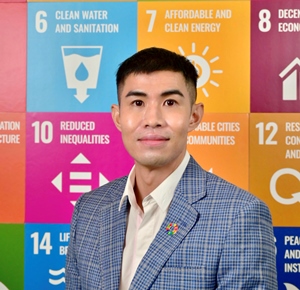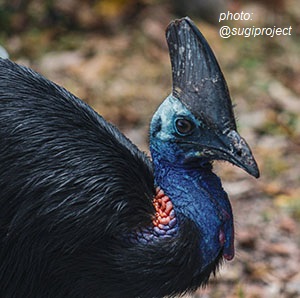As the COVID-19 pandemic has moved health to the top of everyone’s agenda, sustainable development — which is conducive to a healthy environment — is gaining traction.
The United Nations has put forward 17 Sustainable Development Goals (SDGs). The leader of a start-up incubator which helps entrepreneurs work towards these goals believes start-ups of all varieties should put SDGs front-and-centre as their primary aims.
Platform for entrepreneurs

At the “Winning with a purpose: Running a Business with Sustainable Development Goals” webinar organised by the Hong Kong Trade Development Council (HKTDC) earlier this month, Global Citizen Capital CEO Kenneth Kwok said Hong Kong entrepreneurs wanting to set up start-ups with sustainable goals should draw on UpLink, a World Economic Forum (WEF) digital crowd-engagement platform that presents SDG challenges for start-ups to meet.
Challenges on UpLink range from the Trillion Trees: Amazon Bioeconomy Challenge – to protect and restore biodiversity in the massive South American rainforest – to Clean Air for all – tackling air pollution.
Mr Kwok said the project gave Hong Kong entrepreneurs an opportunity to become eco-unicorns. “You are not just worth US$1 billion, but have the opportunity to enrich a billion lives.”
UpLink, which launched last year, was WEF’s first open-to-all project, he said. Even high-school students can join, and anyone can make their voice heard and submit a solution. The WEF established the UpLink platform in 2020. Mr Kwok is an UpLink innovator.
The WEF is an international organization for public-private cooperation established in 1971. The Forum engages “political, business, cultural and other leaders of society to shape global, regional and industry agendas”.
UpLink also has action groups that offer thought leaders and activists curated platforms to discuss roadblocks to achieving SDGs and link up with like-minded people worldwide. Hong Kong has a thriving start-up ecosystem and many entrepreneurs are interested in attaining SDG goals. Networking and technology sharing comprise the life-blood of start-up hubs such as Hong Kong. In the same way, working with a global hub of hubs UpLink opens the entire world to the city’s entrepreneurs.
Solutions from Hong Kong include AMPD Energy, Carbon World, Family Mask and Ecoinno.
Stephen Liang, Assistant Executive Director at the HKTDC, said the HKTDC is eager to form links between the start-up ecosystem in Hong Kong with overseas and international ecosystems such as UpLink.
“This collaboration will create more opportunities for Hong Kong start-ups,” Mr Liang said. “For this webinar it is our first step to introduce the UpLink community to Hong Kong start-ups and we hope to encourage Hong Kong start-ups to look into solutions that target in the Sustainable Development Goals and use the UpLink community to gain global visibility.”
Forest cover

To give first-hand examples of how start-ups can achieve sustainability goals, Elise van Middelem addressed the webinar from Switzerland where she runs SUGi, the activation hub for the Rewilding Generation which she founded. SUGi aims to boost biodiversity and enrich people’s lives by restoring natural forests in urban areas. One project in Gurrbum, south of Cairns in Australia’s Queensland, was established to give the endangered southern cassowary a corridor between stretches of forest habitat.

The webinar also heard from a high-technology start-up established by Ziga Drev, Founder & Managing Director at Trace Labs which uses blockchain technology to ensure that all supply-chain materials and services that went into a product were sustainably and ethically sourced. Both SUGi and Trace Labs are UpLink Innovators.
Both speakers said joining the UpLink community backed by WEF gave them tremendous visibility to the global market and partners who shared similar visions on sustainable development goals. Being UpLink Innovators gives them a platform to raise capital through crowdsourcing, access to data they needed to gather for their business and expand their global footprints.
Diverse ecology

Ms van Middelem said the SUGi rewilding initiative boosted biodiversity, educated communities and restored the environment by involving the entire community in planting dense forests in previously derelict areas. There are more than 90 SUGi projects on every inhabited continent, including one in the New Territories of Hong Kong. The projects have planted 95,000 native trees (at a density of three per square metre) and restored more than three hectares of land so far.
SUGi uses a rewilding technique pioneered by Japanese botanist Akira Miyawaki who planted a wide range of native plants, packed extremely density, to create forests, sometimes in small plots. Mr Miyawaki planted more than 40 million native trees, she said. His technique is based on resilience, bringing back the ancient forests.
Ms van Middelem initially worked in luxury marketing. “But I was overwhelmed by the scale of the ecological problems,” she said. “I wanted to do something positively impactful.” She looked at many tree-planting schemes. “But many were monoculture schemes which were not restorative. Also none of them seemed to offer the opportunity to track and follow my investment.” That is why she founded SUGi which lets investors stay in touch with what they do.
The forests bring restore biodiversity, bringing birdlife into cities, she said. The restored soil also acts as a sponge, mitigating stormwater runoff.
The first project was on a landfill site within Beirut, Lebanon.
Transparent supply chains
Mr Drev said Trace Labs had set up Origin Trail, a blockchain based supply chain ecosystem to ensure transparency throughout the complex, global supply chain network.
“We believe sustainable supply chain networks are only possible by allowing people and organisations to benefit from trusted knowledge exchange,” he said.
Indicating the scale of the problem, he quoted a 2017 report in the United Kingdom saying 32% of manufacturers could not guarantee the ingredients they used were not fraudulent.
Origin Trail works with the Supplier Compliance Audit Network (SCAN) in the United States which includes 55 members that represent the largest American importers, with US$1.5 trillion in annual purchasing power and accounting for 40% of imports into the US.
Mr Drev said Trace Labs began in 2011 with a food supply chain solution, then realised it could be applied to many other supply chains improving trust and transparency. Trace Labs began in Slovenia before going on to Italy and elsewhere in Europe before venturing into Mainland China.
They developed a solution for a retailer which in turn brought them the business of WalMart China. This encouraged them to set up in Hong Kong where they have established a company developing traceability solutions.
“We need to make sure that, as products flow, so does data, moving through different parts of the supply chains,” Mr Drev said. “Global supply chains can be disrupted if the flow of data is interrupted.” He said the recent blockage of the Suez Canal by a container ship was caused by a lack of interoperability between two supply chain systems.
Data was moving into silos and out of general view, he pointed out, and supply chains were not, in fact chains, but really complex networks. But reliable data flow depended on inclusivity and interoperability making transparent, visible to all, data vital.
Trace Labs launched the Origin Trail open-source blockchain protocol in 2018, when it also linked up with the British Standards Institution which establishes standards for supply chain data.
Giving an example of how the system worked in practice for consumers, he said a shopper in a supermarket simply had to scan the code on a pack of chicken to obtain full details on the product’s origins. This lets consumers confirm the sustainability of the product. “Some research suggests that as many as eight out of 10 consumers check on such details,” he said.
Since Origin Trail uses public, decentralised data without a hub database, the solution can be easily scaled and used by a wide range of supply chain tracking and reporting systems, according to Mr Drev.
Related links
UpLink
SUGi
Trace Labs
United Nations Sustainable Development Goals
Full webinar
